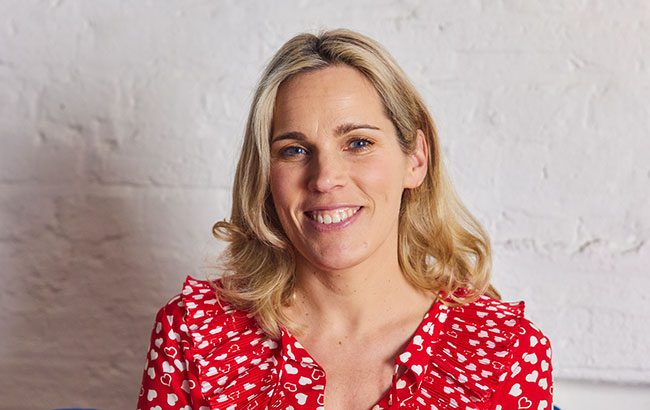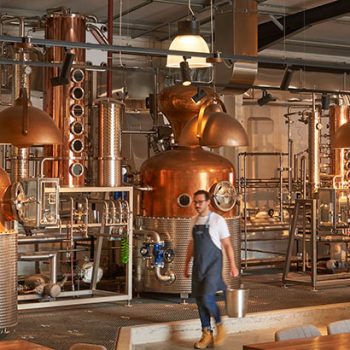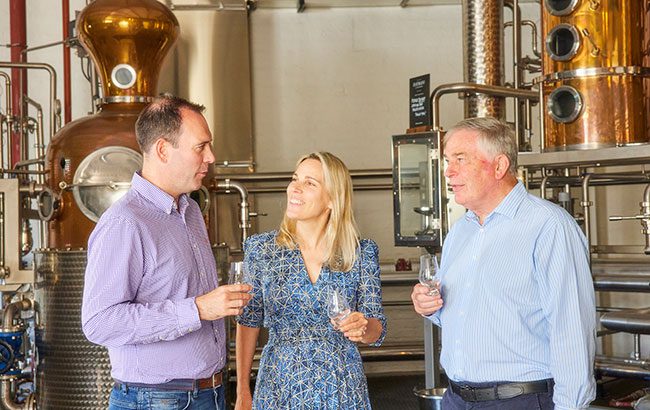The big interview: Miranda Hayman, Hayman’s Distillery
By Melita KielyMiranda Hayman, of family-owned Hayman’s Distillery in London, is celebrating 20 years at the company. She tells SB about why this time working in gin has been a once-in-a-lifetime experience.

“I feel incredibly fortunate,” says Miranda Hayman, as she reflects on 20 years at London’s Hayman’s Distillery. For one, she is part of a business with family at its core. “To work with my father [Christopher Hayman] and brother [James Hayman] – and that we get along – is a real positive. And to have gone through the unprecedented change in gin from when I started to now, I think that’s a once-in-a-lifetime experience. And finally, it’s just a fantastic industry to work in,” she adds.
When Miranda started at the company in 2005, the gin category looked completely different to today’s vibrant assortment of brands. “No one was talking about gin in 2005; it just wasn’t on the agenda,” she recalls. “The digital space wasn’t what it is today, it was incredibly different. Trends were far more influenced by the on-trade, and also by independent retailers. There wasn’t the same speed because you didn’t have online marketing, advertising, or sales. It didn’t exist. It was far less sophisticated as a market.”
Curious bartenders
Miranda commends a “small but increasing number of curious bartenders”, keen to discover new, authentic brands, for getting behind the gin category – and Hayman’s as a brand. “They came to us because they knew we had a family history,” she says. “The on-trade really spearheaded a lot of the curiosity around gin, the growth, and the cocktail culture we see today.”
Even for Miranda, gin’s long-lasting boom has been a pleasant surprise. Questions about gin’s demise have circled for ages, but the past couple of years have seen the category continue to grow globally. IWSR data showed volume sales rose globally by 2% from 2023 to 2024, albeit slower than the 4% seen in 2023. While value was flat, it’s not a bad innings for a category that has been continually on the up.
“We asked in 2014, ‘Do you think we’re at the peak of gin now?’,”Miranda says. “And we thought, ‘Yes, maybe…’. But it continued for several more years, and it has only been in the past few years really that we’ve seen that ‘peak’ is over. So gin has had a really good stint, and there’s a lot of life left in the category yet.”
Unlike her sibling James, also a co-owner of Hayman’s Gin with Miranda, the family business wasn’t always a given for Miranda. “I’ve always enjoyed a G&T, so that’s a good start,” she quips, and recounts visiting the distillery with her father when she was younger. At university, Miranda studied French and Spanish, and was keen to use her languages professionally. Her career began in the wine industry, where she worked for eight years. It wasn’t until she relocated to Hong Kong for her husband’s job that Miranda started seriously considering her place at Hayman’s Gin. She was clear that joining the family business had to come with the right role for her interests and skills – and while she was in Hong Kong, the potential for exports was soon realised.
“I focused on exports in that region – Asia, Australia, and New Zealand,” Miranda says. “It really felt like the right time for me to join the business – there’d never been any pressure from dad. He always thought we should get experience elsewhere, which was really valuable, and he also felt strongly that the next generation has to have their own energy and passion; you can’t just continue what you pick up, because you have to have the energy to move things forwards. It is challenging running a family business.”
She continues: “It was quite challenging building Hayman’s in Asia because, again, gin was not on people’s agendas. But we had a long-term approach; you have to keep chipping away. And we still work with a lot of the importers we found during my time over there.”
Respected businesses

She notes how outside of the UK, family businesses are seen differently. “They are very respected,” she says. “Perhaps that’s because of the culture.” One thing that also makes Hayman’s appealing to work with, Miranda adds, is “we’re not looking at an exit strategy in five years. We’re looking to grow with our distributors and partners, which appeals because they’re also looking at the long term. That is an appeal internationally, and that has probably been a big factor in where we are now.”
Miranda and James work closely on strategy and direction, sound-boarding ideas to one another in anticipation of honest feedback – in the most unadulterated form that only a sibling can understand. Miranda describes James’s core focus and skills as creative and being the ideas-generator, while her expertise falls more on people and marketing.
I ask Miranda how, after two decades at Hayman’s, she remains motivated and inspired. She replies: “That’s something James and I talk about a lot, how do you refresh yourself? You have to have this innate passion for what you do, and I really care about gin. We really care about gin for future generations. We care about the people enjoying our gins, and that’s been really instilled by dad. Hayman’s is now sold in over 70 markets, and I never fail to be proud when I see it in a different country, whether that’s in a restaurant, a bar, or in duty free.”
She credits her team for also keeping her inspired, in addition to the big milestones and goals. “Obviously, financial success is important because we want to keep on growing. We have this innate ambition to be the UK’s leading gin, and internationally. I feel fortunate and privileged that my great-great-grandfather, in 1863, set up a gin distillery and we’re still here today. I really hope if he walked through the door he’d be proud of what we’ve done and created.”
Miranda credits her great-great-grandfather for being a pioneer of the London Dry gin style. That commitment to creativity and innovation is instilled in the company even today. In recent years, Hayman’s has created a plethora of products to appeal to new audiences and tap into developing trends. One example is Hayman’s London Light, a low-alcohol spirit launched in 2023, at 12.5% ABV. The aim was to give consumers a new way to enjoy a low-alcohol ‘gin’ and tonic, as the moderation trend grew. It followed the distillery’s 43% ABV Small Gin in 2019, created to be so rich in botanical character that only a 5ml pour is needed to create a full-flavoured gin and tonic, at a fraction of the ABV.
Furthermore, this year the brand added a ready-to-serve Freezer Martini to its roster, catering to the demand for convenient cocktail serves.
This level of new product development is not easy, Miranda explains, as an independent, family-owned company. The brand has to compete against others that benefit from private equity and high investments, “who are doing some very exciting, creative things”.
Talking about the influx of new brands and products, she says: “The best of the best will survive, and quite a few will probably disappear. When you’re a family business with a long-term approach, quick fixes don’t always feel right; you have to stay true to who you are to stand the test of time. That is quite challenging in a very competitive, saturated market, with brands that are coming in and making a big noise – but that might disappear a few years later. So, whenever we release new products, from flavoured gins to our Freezer Martini, we have to make sure they are creative while still aligning with our long-term vision.”
Plus, they must remain true to the gin category. Over the years Hayman’s has been steadfast in its belief that gin’s authentic, juniper-forward profile should be protected, while welcoming flavour innovations. In 2018, the distillery embarked upon a campaign to call out ‘fake gin’, concerned by the number of products coming to market that lacked the necessary juniper flavour – while still touting themselves as ‘gin’.
“There are some very good flavoured gins in the market,” Miranda says. “But when it was starting to border on ridiculous bubble gum-flavoured gin, we felt the integrity of gin was being threatened. And, actually, it’s going to be the classic styles that will preserve gin for future generations. If you look at the classic cocktails, they’re timeless, and the two go hand in hand.”
There’s also no shying away from the tricky economic climate the spirits industry finds itself in. It’s something Miranda and her team must be very conscious about. As consumers seek more value for money, and tie that value to more experiential moments, Hayman’s has taken note. Throughout the summer, the London-based distillery has been hosting its Summer Sessions evenings, where guests can head to the distillery to enjoy cocktails in the courtyard in front of the stills, with the added bonus of a 15% discount in the distillery shop. Miranda says it’s proven to be very popular and has been a great way to connect with Hayman’s fans more personally.
Proactive and reactive
Commenting more broadly on the industry’s challenges, Miranda says: “We have to keep acting quickly to situations. You have to be as proactive as you can, but sometimes it’s just about being reactive. That creates a lot of pressure. There have been lots of tax increases – and hospitality venues are really feeling this. Prices have gone up, and that is challenging for consumers who will question, ‘Well, what can I buy for this price in retail, and why is it so much more in hospitality?’
“But I feel very passionately that hospitality isn’t just about buying the gin and tonic; it’s a whole experience. It’s a social experience. The British pub is such a foundation – the bedrock – of our society. As an industry, we really have to work hard to support our hospitality industry as best we can.” Part of this support comes via the training academy launched by Hayman’s a few years ago. The idea came about after the Covid-19 pandemic as Hayman’s looked for ways to give back to the bartender community.

“Again, this ties back to our long-term approach, so we hold weekly training academy workshops that are open to everyone in hospitality and retail, where venues can bring their teams and new starters in, and we’ll tailor it according to what they want us to focus on,” she explains.
The future for Hayman’s includes much more than gin. In 2022, the distillery repurposed its grain spirit to create a sustainable vodka, called Respirited. Plus, after launching London’s first rum blending house for more than a century in 2019, Charles Merser & Co, the company is on the cusp of opening a brand home for Merser Rum in London this year. It will be situated next door to the Hayman’s Distillery. “We won’t distil our own rum. We will bring what we believe are the world’s finest rums and blend them into Merser,” Miranda explains.
But gin will remain the core of Hayman’s output. And there is a lot of untapped potential out there, Miranda notes. While growth is slowing in mature markets like the UK and Spain, the US is growing from a smaller base where gin has not yet fully taken off.
Gin reset
However, Miranda is realistic about the next five to 10 years, which have become increasingly difficult to predict. She notes: “It’s highly unlikely we’ll go back to the last 10 years. That’s happened, it’s been unprecedented, but I think we’re moving into a gin reset, a normalisation of gin going back to historically what it was, and probably levelling with the other spirits. There will probably be less innovation, caused by saturation and some fatigue. A lot of the future will also depend on external economic conditions. We are probably going to have to be more proactive than ever, and really listen to the market and what’s needed. But we’re excited for what’s to come, and continuing this legacy we’ve built.”
Related news
Salford Rum maker launches its first gin
